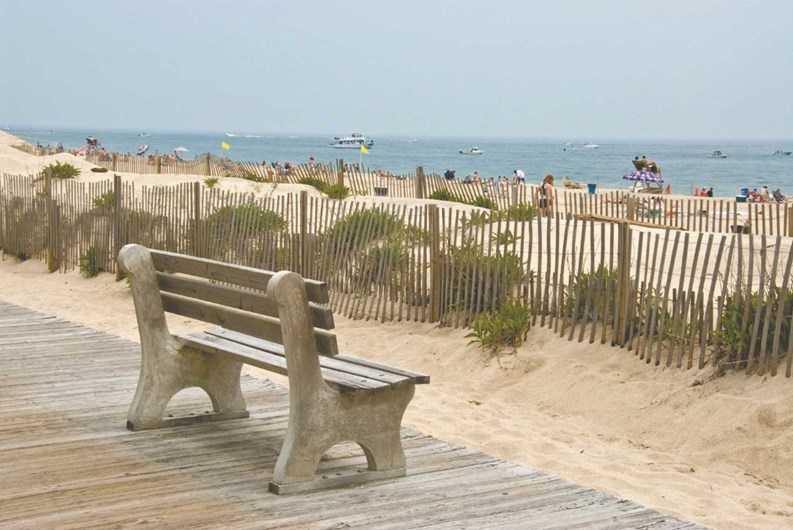Whether its the close proximity to the coast, the reassurance of knowing its a safe place to raise children or simply its easy distance from the bright lights of Atlantic City, Egg Harbor Township in southeastern New Jersey has something for everyone. The word is spreading, too, as more people take notice of its large selection of new homes and developing communities. The township’s population, in fact, has grown more than 25 percent in the last seven years, not too bad for a place that was mostly farmland just a century ago.
Bordered on the west by Hamilton Township, to the north by Galloway Township, to the east by Absecon, Pleasantville, Northfield, Linwood and Somers Point with Ocean City and Estell Manor to its south, Egg Harbor Township is centrally located, offering nearby big city amenities while maintaining its small-town feel. “Egg Harbor is the center point of Atlantic County,” says Shari Tomasini, a broker with Sellstate Innovative Realty, LLC, in Northfield. “It’s the best of both worlds. You’re close to (Atlantic City), but you’re far enough away that you can enjoy the suburban life.”
Although places like Egg Harbor are suffering from the same housing slump felt all over the United States, it is still a place of extraordinary development with new planned communities rising from its landscape seemingly every day. From single family homes, to townhouses to adult living communities, nearly every type of habitation is available within the confines of Egg Harbor Township. In fact, more than 50 percent of Egg Harbor’s existing homes were built since 1980 with more than 23 percent erected since 1999.
Where It All Began
The history of Egg Harbor Township goes back more than 300 years to the late 1600s when it was first mentioned in records for Gloucester County. The land that would eventually become Egg Harbor was first claimed by the Dutch who were settling the East Coast with carefree abandon in the 17th century. Egg Harbor got its name, in fact, from Dutch explorer Cornelius Jacobsen Mey in 1614 when he stumbled upon the inlet for the Great Egg Harbor River. He noticed that the shoreline was covered with the eggs of local birds and dubbed it “Eyren Haven,” which translates to Egg Harbor.
The land was originally inhabited by the Lenni Lenape Native American tribes, who sold much of the land in a somewhat questionable deal to the New Jersey legislature in 1832 for just $2,000, relinquishing all their rights to the area from that day forward.
In the early 1700s, Egg Harbor was still part of Gloucester County, with Great Egg Harbor River serving as its western boundary. A bit later in the century, Great Egg Harbor encompassed the geographic area known today as Atlantic County. In 1837, according to the Egg Harbor History at www.eht.com, was “Atlantic County set apart from Gloucester County and the Townships were: Egg Harbor, Weymouth, Hamilton and Galloway.” And so Egg Harbor Townships was born.
The heavily-wooded land remained rural for decades with local inhabitants earning their livelihoods from industries such as timber, taking advantage of the thick growth of oak, maple and chestnut trees. That timber also served as the basis for a charcoal manufacturing industry that employed many families in the early years of Egg Harbor’s existence. Because of the township’s close proximity to the ocean and the easy shipping route that came with the Great Egg Harbor River, the township also had a good, solid business in the shipbuilding industry.
Blessed with large tracts of arable land and good water supplies, farming was another industry that employed a great many individuals. Sheep were raised and a good living was made through textiles and wool exports. Even into the early 20th century, “Egg Harbor was still a rural farming community,” says June Sheridan, township historian. And although a few farms still dot the landscape, Sheridan says “basically today we’re a community that’s become highly developed.”
In recent years, the development Sheridan refers to is the result of the township’s high-growth area designation by the New Jersey Pinelands Commission. “The Pinelands was a state program designed to preserve the aquifer of the Pine Barrens in the state of New Jersey,” Sheridan says. “They made a preservation area where development would be eliminated or limited.” As a sort of trade-off for preserving certain areas, the commission also designed areas of high growth to be developed for new housing. Egg Harbor Township’s proximity to Atlantic City is the reason it was chosen to be a high-growth area. “It’s dramatically changed the whole landscape,” Sheridan says.
Some of that growth has come at a large cost as now the township’s infrastructure struggles to support a larger population. Traffic can get tangled, and support services such as the police department and the all-volunteer fire department feel the strain sometimes. It’s a township in transition, working hard to keep up with new demands and needs.
Family-Oriented Community
Despite the number of diverse industries that supported Egg Harbor’s families over the centuries, the region never exploded economically, instead it maintained a solid, steady economic pace through the years. Never too wealthy, but never too financially unstable either—the geographical equivalent of the tortoise rather than the hare.
Today, Egg Harbor Township is a solid, middle class bedroom community with a low crime rate and a steady real estate market. The township is home to an estimate of 38,000 residents, up from 30,726 in 2000, living in a smaller area than their ancestors. At one time, “we were as large as Atlantic County, but many communities have split away from us over the years,” says Sheridan.
The community is filled with married couples, mostly in their mid-thirties, and nearly one-third of whom have children. Egg Harbor is solidly middle class with an average household income of $58,000. A large percentage of families earn their living either by working in Atlantic City or by working in one of the support industries that has grown around the casinos. Because of the influx of residents from a growing Atlantic City, Egg Harbor has seen the addition of shopping centers, malls, restaurants and other entities designed to create a welcoming, family community for those who work in the gaming industry. Egg Harbor is also supported by a federal tech center nearby that does substantial amount of work for the Federal Aviation Administration, a Coast Guard Rescue facility as well as the Atlantic City International Airport. A great many residents are considered white-collar workers, earning their paychecks in professional, managerial and service industries. “There are more jobs here than ever before,” Sheridan says.
The Housing Scene
The sudden growth spurt that Egg Harbor has experienced in recent years has not detracted from the township’s charm, however. “Egg Harbor is still rural in spots,” Sheridan says. Home sites near the river, in fact, were designated by the commission as being low-density, meaning residents need five acre plots on which to build their homes. This ensures the continuation of the wide-open spaces that made the community special.
“It’s a lovely community with people who love the past and want to restore a lot of these older homes,” Sheridan says. Families choose Egg Harbor over other neighboring communities for a number of reasons, says Christine Cleary of Century 21 Alliance real estate. “The taxes are a little lower here,” she says, “and you can get a bigger piece of land with your home. You get a bit more for the money than in other places.”
Egg Harbor Township is the perfect place for individuals or families looking for newer homes and townhouses. “People like the newer homes,” Cleary says. “And a lot of them are spread out because this is such a big area.”
Because of nationwide housing downturns, the market for condos and other dwellings in Egg Harbor is relatively soft. Last year, from March 1 through September, 59 condos sold in the area, says Tomasini. This year, over the same period of time, less than half that number sold. Realtors have close to a year’s backlog of properties and home prices have dipped just over one percent. “It’s definitely a buyer’s market,” Cleary says. Today, Century 21 listings reflect a three-bedroom, two and a half bathroom condo townhome for $147,000—definitely a bargain when it comes to overall New Jersey home prices.
Still, though, “the condo market is probably the best way to go right now because it’s affordable,” says Tomasini. There’s a large range of choices available, with smaller condos starting at $99,000 all the way up to larger, more palatial developments offering three-bedrooms and two and a half-bathrooms for around $649,000. “You can start small in a condo and move up over time,” Tomasini says.
For couples looking for new, still relatively undiscovered territory in New Jersey, it’s hard to beat Egg Harbor Township. Close to Atlantic City, close to the beach—it even has nine golf courses and is close to Storybook Land Amusement Park—there are plenty of activities in this quiet, stable community. And when it comes to calling a place home, what more could anyone ask for?
Liz Lent is a freelance writer, teacher and a frequent contributor toThe New Jersey Cooperator.







Leave a Comment